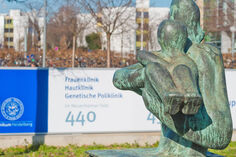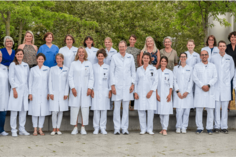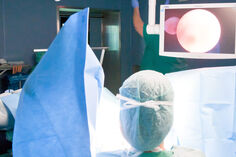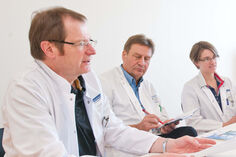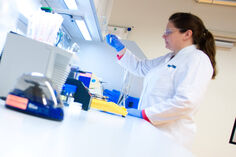AG Reproduktionsimmunologie
Bei der Implantation des Embryos und der Entwicklung einer Schwangerschaft spielen außergewöhnliche immunologische Prozesse eine wichtige Rolle. Der Fetus stellt ein semi-allogenes Transplantat dar, welches das mütterliche Immunsystem kontinuierlich herausfordert. An der materno-fetalen Grenzzone finden immunologische Reaktionen statt, die streng reguliert werden müssen und Teil der physiologischen Anpassungsprozesse während der gesamten Schwangerschaft sind.
Implantationsversagen und gestörten Schwangerschaftsverläufen wie Früh- und Fehlgeburten liegen vielfach immunologische Fehlregulationen zugrunde.
Die Immuninteraktion zwischen Mutter, Embryo, Fetus und Neugeborenem zu verstehen, zu erkennen und zu regulieren sind die großen Herausforderungen in der Reproduktionsimmunologie. Ein besseres Verständnis dieser Prozesse kann nur durch eine interdisziplinäre Betrachtung geschehen. Deshalb versteht sich unsere Arbeitsgruppe als ein Baustein einer vernetzten Kollaboration mit Arbeitsgruppen der Geburtshilfe, Kinderheilkunde (Neonatologie) und der Transplantationsmedizin.
Ein Ziel unserer Bemühungen ist die Identifizierung gemeinsamer immunologischer Muster und Pathways, von denen wir erwarten, dass sie für die reproduktive und perinatale Immunität einzigartig sind. Ein Schwerpunkt der interdisziplinären Projekte liegt auf einer frühen translationalen Anwendung. Neben der Etablierung einer immunologischen Diagnostik bei Implantationsversagen und wiederkehrenden Fehlgeburten steht die Entwicklung risikofaktor-spezifischer Therapiemodelle im Fokus.
Forschungsschwerpunkte
- Immunologische Profile bei Patientinnen mit rezidivierenden Fehlgeburten und Implantationsversagen
- Periphere und endometriale Immunmarker zur Prädiktion reproduktionsmedizinischer Komplikationen
- Entwicklung immunmodulatorischer Therapien bei Kinderwunsch
Leitung
Team
Kooperationen
- Prof. Dr. med. B. Toth
Universitätsklinik für Gynäkologische Endokrinologie und Reproduktionsmedizin, Innsbruck - Prof. Dr. med. V. Daniel
Transplantationsimmunologie, Universitätsklinikum Heidelberg - Hannes Hudalla
Zentrum für Kinder- und Jugendmedizin, Klinik Kinderheilkunde IV (Neonatologie), Universitätsklinikum Heidelberg
Publikationen
Hudalla H, Karenberg K, Kuon RJ, Tschada R, Pöschl J, Frommhold D
LPS-induced maternal inflammation promotes fetal leukocyte recruitment and prenatal organ infiltration in mice
Pediatr Res. 2018 Nov;84(5):757-764
https://www.ncbi.nlm.nih.gov/pubmed/30135596
Zhu L, Aly M, Wang H, Karakizlis H, Weimer R, Morath C, Kuon RJ, Toth B, Ekpoom N, Opelz G, Daniel V.
Changes of NK cell subsets with time post-transplant in peripheral blood of renal transplant recipients.
Transpl Immunol. 2018 Aug;49:59-71
https://www.ncbi.nlm.nih.gov/pubmed/29702201
Zhu L, Aly M, Wang H, Karakizlis H, Weimer R, Morath C, Kuon RJ, Toth B, Ekpoom N, Opelz G, Daniel V.
Increased natural killer cell subsets with inhibitory cytokines and inhibitory surface receptors in patients with recurrent miscarriage and decreased or normal subsets in kidney transplant recipients late posttransplant
Clin Exp Immunol. 2018 Aug;193(2):241-254.
https://www.ncbi.nlm.nih.gov/pubmed/29679490
Zhu L, Aly M, Wang H, Karakizlis H, Weimer R, Morath C, Kuon RJ, Toth B, Opelz G, Daniel V
Decreased NK cell immunity in kidney transplant recipients late post-transplant and increased NK-cell immunity in patients with recurrent miscarriage.
PLoS One. 2017 Oct 17;12(10)
https://www.ncbi.nlm.nih.gov/pubmed/29040297
Kuon RJ, Weber M, Heger J, Santillán I, Vomstein K, Bär C, Strowitzki T, Markert U, Toth B
Uterine Natural Killer cells in patients with idiopathic recurrent miscarriage
American Journal of Reproductive Immunology. 2017 Oct;78(4)
https://www.ncbi.nlm.nih.gov/pubmed/28639334
Kuon RJ, Togawa R, Vomstein K, Goeggl T, Strowitzki T, Markert UR, Zimmermann S, Daniel V, Dalpke AH, Toth B
Higher prevalence of colonization with Gardnerella vaginalis and gram-negative anaerobes in patients with recurrent miscarriage and elevated peripheral natural killer cells
Journal of Reproductive Immunology. 2017 Mar 30;120:15-19
https://www.ncbi.nlm.nih.gov/pubmed/28388469
Kuon RJ, Müller F, Vomstein K, Weber M, Hudalla H, Rösner S, Strowitzki T, Markert UR, Daniel V, Toth B
Pre-pregnancy levels of peripheral natural killer cells as markers for immunomodulatory treatment in patients with recurrent miscarriage Archivum Immunologiae et Therapiae Experimentalis. 2017 Mar 11. 65(4):339-346.
https://www.ncbi.nlm.nih.gov/pubmed/28283683
Kuon RJ, Weber M, Vomstein TK, Müller F, Seitz C, Strowitzki T, Schleussner E., Markert UR, Daniel V., Toth B
The "killer cell story" in recurrent miscarriage: Association between activated peripheral lymphocytes and uterine natural killer cells
Journal of Reproductive Immunology. 2016 Nov 6;119:9-14
(https://www.ncbi.nlm.nih.gov/pubmed/27865124)
Kuon RJ, Schaumann J, Goeggl T, Strowitzki T, Sadeghi M, Opelz G, Daniel V, Toth B
Patients with idiopathic recurrent miscarriage show higher levels of DR+ activated T-cells that are less responsive to mitogens
Journal of Reproductive Immunology. 2015 Nov;112:82–7
(https://www.ncbi.nlm.nih.gov/pubmed/26398781)
Kuon RJ, Hudalla H, Seitz C, Hertler S, Gawlik S, Fluhr H, Gausepohl HJ, Sohn C, Poeschl J, Maul H
Impaired Neonatal Outcome after Emergency Cerclage Adds Controversy to Prolongation of Pregnancy
PLoS ONE. 2015 Jun 29;10(6):e0129104
(https://www.ncbi.nlm.nih.gov/pubmed/26121653)
Kuon RJ, Strowitzki T, Sohn C, Daniel V, Toth B
Immune profiling in patients with recurrent miscarriage
Journal of Reproductive Immunology. 2015 Apr;108:136–41
(https://www.ncbi.nlm.nih.gov/pubmed/25771397)
